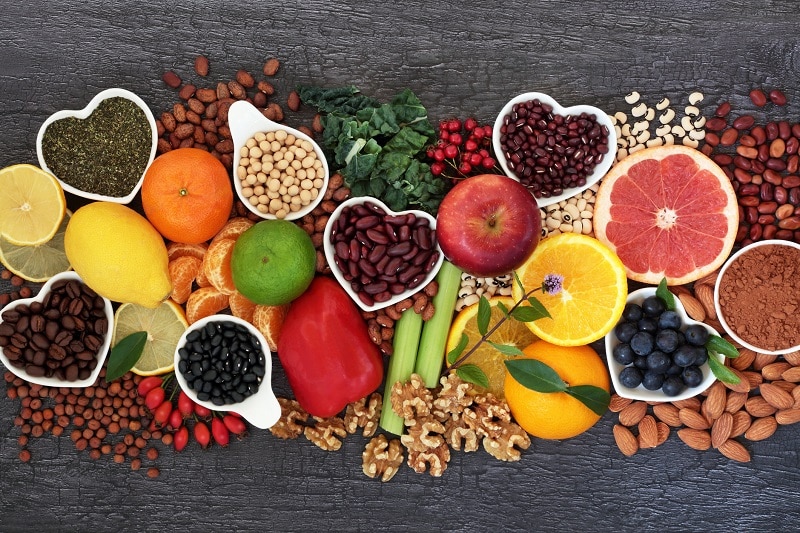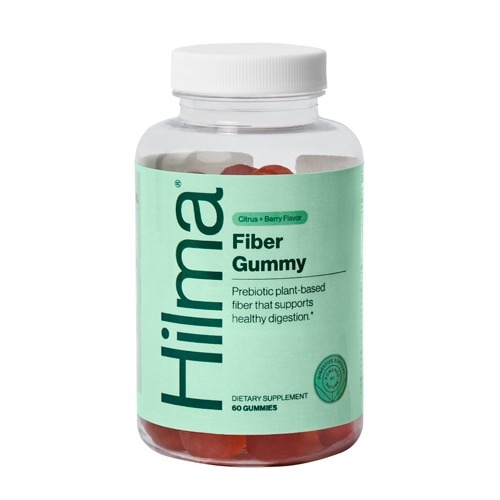[vc_row][vc_column][vc_column_text]The human heart is everyone’s lifeline. If the heart stops, the human stops. It is constantly working, even when sleeping. Keeping that hard-working heart healthy is crucial. There are many different factors that can affect heart health including genetics, exercise, smoking and diet. One main dietary factor is fiber. A healthy dose of fiber-rich foods added to your diet regularly can have a positive impact on several factors related to heart health. Read on to learn the types of
fiber, what foods pack the biggest fiber punch and why it’s fabulous for your health.

Types of Dietary Fiber
Most Americans are not consuming enough dietary fiber. In fact, most are only eating 50-60% of the daily recommendation. It is recommended to consume
25-30 grams of dietary fiber each day. There are two types of fiber: soluble and insoluble.
- Soluble fiber – When digesting soluble fiber, the fiber absorbs water. This type of fiber has been shown to play a role in heart health by potentially lowering cholesterol and helping control blood sugar levels. Soluble fiber can be found in fruits, vegetables, beans and oats.
- Insoluble fiber – Insoluble fiber promotes healthy digestion and is also part of a well-balanced diet. Insoluble fiber does not absorb water and moves unchanged throughout the digestive tract, assisting with the flow of food and waste though the digestive system. Insoluble fiber can be found in fruits, vegetables, whole grains including whole grain pasta and bread.
A lot of products contain both soluble and insoluble fiber, and the daily recommendation does not specify to prioritize one type over the other. What’s important is that you don’t forego fiber in your diet. Learn all the ways it improves cardiovascular function.
Fiber and Heart Health
Cardiovascular disease (CVD) – CVD is one of the leading causes of death in the United States. A simple addition of 7 grams of fiber into your meals each day may lower the risk of CVD by
9%. To put that into perspective, that would be the equivalent of adding ¼- ½ a cup of beans to your daily diet.
Cholesterol – Cholesterol is natural in the body, and it plays a functional role in heart health. There are two different types; high-density lipoprotein (HDL) cholesterol (this is known as good cholesterol) and low-density lipoprotein (LDL) cholesterol (this is known as bad cholesterol). An imbalanced diet may lead to excess LDL cholesterol which may then lead to heart disease. A balanced diet including dietary fiber may
lower LDL cholesterol levels in the blood.
Blood pressure – Blood is constantly flowing throughout the arteries in our body. The pressure with which it pushes through the arteries naturally rises and lowers, but a regularly high blood pressure (also known as
hypertension), may be damaging to the heart. Keeping a healthy blood pressure is important for good heart health. Eating the recommended amount of
fiber each day may help lower blood pressure, keeping your blood flowing regularly and your heart healthy.
Blood sugar – Blood sugar levels naturally ebb and flow throughout the day depending on dietary intake, activity, body stress and more. Keeping your blood sugar levels in a healthy range is important for heart health. Regular high blood sugar levels create an increased risk of heart disease and potential additional complications.
Fiber can help keep your blood sugar in a healthy range. Fiber is satiating, allowing your body to feel full for longer periods of time. It slows down digestion which may prevent a high blood sugar spike after a meal.
Increasing intake
If you have made the decision to add more fiber to your diet, make sure to add a little bit at a time. An immediate increase in fiber, rather than a more gradual increase, may lead to digestive discomfort. It’s also important to drink enough water to assist with digestion.
Small changes can have big impacts. Try swapping white bread with whole grain bread one slice at a time. If you usually eat apples without the skin, next time, keep the skin on. Swap an animal-sourced protein for a plant-based protein like
beans or legumes a few times a week. Next time you are making a
pasta dish, swap the pasta for a whole grain noodle option, or use half pasta and half zucchini noodles. There are endless possibilities when it comes to increasing fiber intake.
Common Sources of Fiber
Fruits
Strawberries (1 cup sliced) – 3.3g
Orange (1 whole) – 2.5g
Apple (1 medium, with skin) – 4g
Vegetables
Broccoli (1 cup chopped) – 2.4g
Corn (1 medium ear) – 2.4g
Carrots (1 cup chopped) – 3.6g
Beans/legumes
Lentils (1 cup cooked) – 15.6g
Chickpeas (1 cup cooked) – 12.5g
Black beans (1 cup cooked) – 15g
Whole grains
Whole wheat bread (1 slice) 1.9g
Oats (1 cup cooked) – 4g
Quinoa (1 cup cooked) – 5.18g
Fiber and heart health go hand in hand. Incorporating fruits, vegetables, whole grains and legumes into your diet can help increase dietary fiber intake. Try adding more fiber one meal at a time. By making small, sustainable changes, you can achieve a healthy heart and healthy life![/vc_column_text][/vc_column][/vc_row][vc_row][vc_column][vc_text_separator title="Featured Products" border_width="2"][vc_row_inner equal_height="yes" content_placement="middle" gap="35"][vc_column_inner width="1/3"][vc_single_image image="173804" img_size="full" alignment="center" onclick="custom_link" img_link_target="_blank" css=".vc_custom_1711128248983{padding-right: 7% !important;padding-left: 7% !important;}" link="https://www.vitacost.com/al-dente-gluten-free-pasta"][/vc_column_inner][vc_column_inner width="1/3"][vc_single_image image="173807" img_size="full" alignment="center" onclick="custom_link" img_link_target="_blank" css=".vc_custom_1711128266048{padding-right: 7% !important;padding-left: 7% !important;}" link="https://www.vitacost.com/simple-truth-organic-tri-bean-blend-15-oz-each-pack-of-4-1"][/vc_column_inner][vc_column_inner width="1/3"][vc_single_image image="173806" img_size="full" alignment="center" onclick="custom_link" img_link_target="_blank" css=".vc_custom_1711128280610{padding-right: 7% !important;padding-left: 7% !important;}" link="https://www.vitacost.com/hilma-fiber-gummy"][/vc_column_inner][/vc_row_inner][/vc_column][/vc_row]




